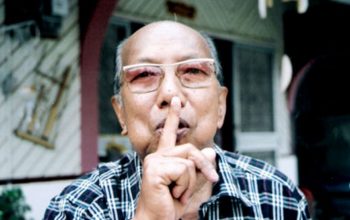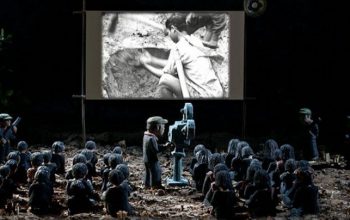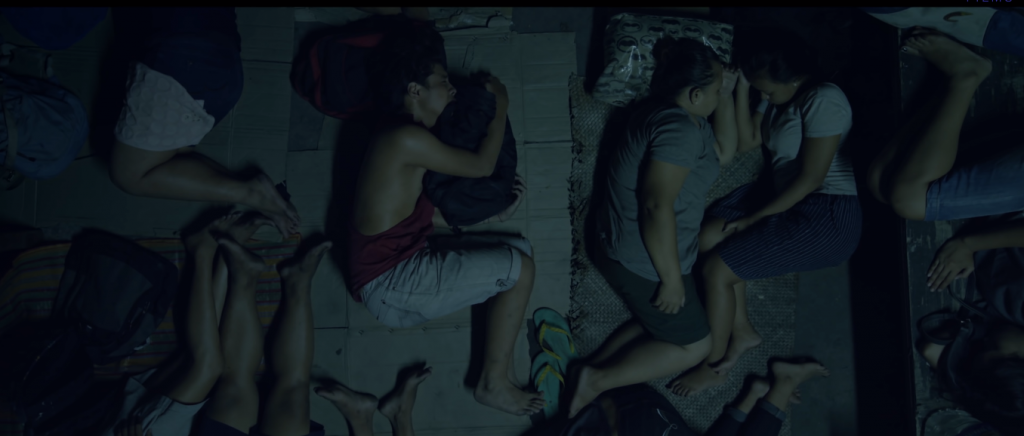
5. Edward
Director: Thop Nazareno
A good Bildungsroman knows the importance of change and discovery. As we reach certain milestones in our lives, we grow and realize, we understand and act, we create and break. But most of all, we become. Thop Nazareno held a post-screening Q&A of his Special Jury Prize-winning film Edward, “coming of age is an exploration of identity and personality.” Nazareno’s follow-up to his trilogy of coming of age (the first being Kiko Boksingero) is a web of truths about the public health care system, or a prison of sorts for employees and patients alike. We see its eponymous character (Louise Abuel) as the voice of many. He brings the sensation as he represents the 20/20 experience of being in a hospital with a loved one who is suffering from a horrible disease. What may be a playground to him at first eventually turns into a labyrinth of suffering.
He helps the nurses by going from ward to ward to check up on each patient, while being given the task of taking care of his own brethren, a father (Dido dela Paz) who had left him at a young age and came back as a burden to his life. He eventually falls in love with a girl (Ella Cruz) from another ward. But mind you, this is not a love story (far from it, as a matter of fact). There is solid value in creating realistic fables of this sort. It speaks and holds the whole truth about people whose responsibility is suddenly bigger than their true selves. Edward was a wee lad, but without him knowing, he became a man in the negative conditions that the hospital had placed upon him. Edward has experienced the cruelties of life at a young age, tearing apart the innocence he will never be able to grasp for as long as he may live. The story all on its own adds layers and layers of what if’s to those who dare watch it. What if there was a cure to his dad’s illness? What if there weren’t thieves lurking around? What if the girl and the boy became together forever? What if the hospital had enough rooms, labor and resources?
The truth of the society lies in the eyes of the witnesses. And for those who have seen it all, like Edward, you should know by now that these “what if’s” will never see the light of day.

4. No Data Plan
Director: Miko Revereza
By now, every single Filipino knows the struggle of being overseas. We’ve seen stories of our overseas workers working in different parts of the world, we’ve read testimonials from them in social media, we’ve listened to their sentiments one way or another. We know. What we don’t know is the gravity of their struggles. We do not know what they must have truly felt. And it’s not because we do not care, mind you. We do not know because we have never been in their shoes before. We never had any first-hand experience of the hardships they had to endure to press on with life. Ironic, isn’t it? How much we think we know about the issues yet never fully grasping the physical, psychological and social aspects surrounding the actual problems our fellow men are facing abroad? Miko Revereza makes use of his first-hand experiences as a migrant in the United States to shoot the struggles of an expat in a foreign landscape, using the Amtrak train ride as a visual representation of such a struggle.
Within the span of three days, a voiceless narrator rides a train moving from Los Angeles to New York. It’s not a travelogue that documents iconic landmarks, important destinations and memorable moments; instead, we get a glimpse of how life is like as an undocumented immigrant in the States, making use of the director’s private memories and experiences, even that of her mother’s, to shed light on how unfortunate foreigners in the country are treated as fugitives in exile. And it’s not just the moving mode of transportation that he has shot to create the metaphors he is targeting; he explores the creases and the crevices of the vehicle to communicate xenophobia, to illustrate the growing anxiety of being hauled off the train and being deported at any given point in time. We overhear mundane conversations in the background and see other vehicles pass by, almost pulling us into the cinematic time Revereza builds in the span of no less than an hour. The film tackles the issues he bring up with a sense of urgency, how there is a need to document everything he and his family is going through, and presents itself almost akin to an essay by devoting its attention on racial conflicts, questioning the promise of having a better future in the United States, where the so-called “American Dream” can only be taken advantage of by the privileged and the entitled. No Data Plan at first will not make sense. But at the end of the train ride, it’ll only be No Data Plan that will make sense. And everything else won’t.
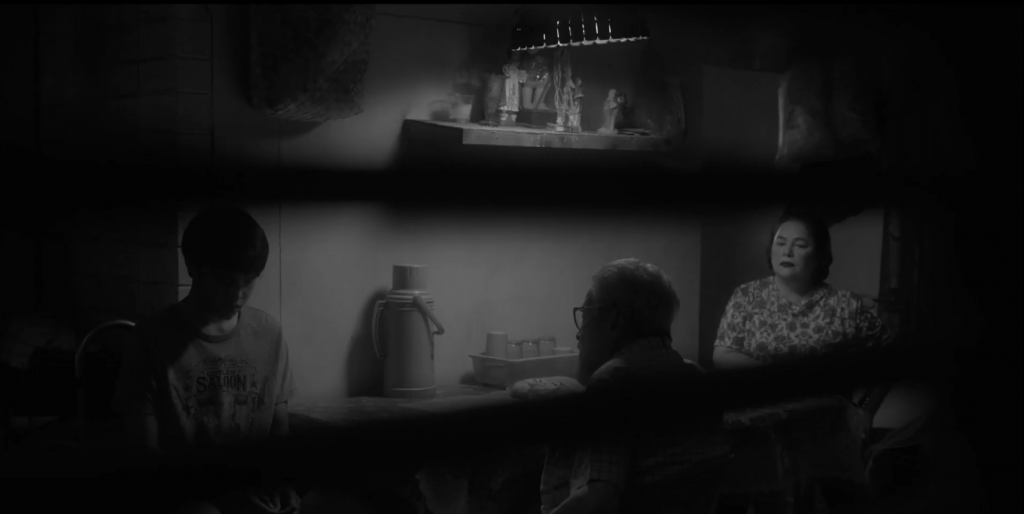
3. Kalel, 15
Director: Jun Robles Lana
Jun Robles Lana directed three films last 2019. He doesn’t have to prove anything anymore at this point for people to recognize how prolific and how talented of a director Lana is. And while quantity does not always equate to quality, any director out there has a 1:10 ratio of crafting a groundbreaking project, given the right material and the right treatment. Two of his films this year, The Panti Sisters and Unforgettable, weren’t exactly my cup of tea. What is similarly commendable about these films, despite my reservations about them, is that there are still shades of nuances that keep them from being a “one star.” And if you’d ask me, that’s not a bad thing. As a matter of fact, this only proves my earlier point about finding or creating something that will put everyone at the edge of their seats. And Kalel, 15 exists in his filmic narrative that year for a reason.
A bleak and nihilistic exploitation of the Filipino society, protruding all levels of hypocrisy, double standards and pseudo-neoliberal ideology, seen through the eyes of an adolescent deprived of familial guidance, Kalel, 15 is not just a state of the nation, but the nation itself. The film dares subvert the common threads of HIV awareness by never relying on emotional manipulation and takes us to a brutal, truthful spiritual journey to the acceptance of identity and liberation of judgment, with its titular character, portrayed to perfection, by Elijah Canlas embracing the layers of agony and anguish as innocence gets stripped off of his body and soul piece by piece through his decisions and actions. At many points, it’s a direct assault to the superficiality of Catholicism, wherein behind the mask of glory and religiosity is nothing more but darkness as everyone gets blinded by their faith and, most importantly, of love (or the lack of it). Beyond the surface, it’s seething with fury and anger as our society refuses to accept and acknowledge the realities of sex and how traditions that we’ve grown accustomed to prevents us from progressing. As the frame starts to get narrower and narrower, so does Kalel’s shot at hope. Kalel is but another victim of this goddamned world and, despite all his attempts to create slivers of hope for him, he will never get a taste of what he wants. Only sweet nothings.
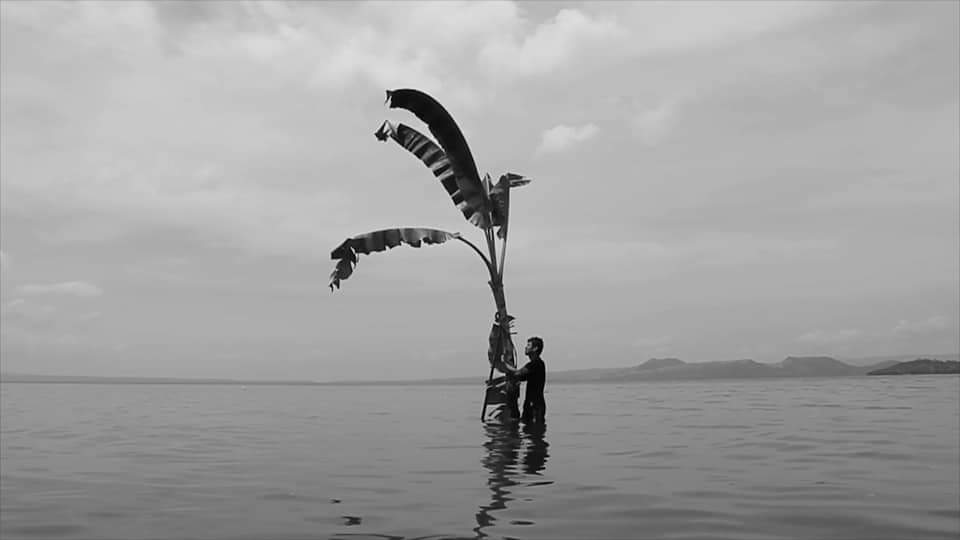
2. For My Alien Friend
Director: Jet Leyco
We all have stories to tell. Each of our personal stories can be unique, once told the “right” way? What is “right”? How do we classify something as correct in terms of storytelling? How does “right” storytelling look and sound like? Why is it important to tell stories in a “right” way? Is there ever really such a thing as “right”? Every frame, lens and narrative is subject to human perception and judgment. Fragments of our reality are both distant and nearby, intimate and profound, realistic and fictional. Images of history and time may flash before your eyes in an instant. Sometimes, they linger for an inordinate period of time until they do their job, whether it’s catharsis or awareness or whatever. Going back to the questions earlier, are there answers to these questions? And if there are, what are they? For Jet Leyco, he doesn’t care. Or maybe he does, especially when he asks twice in his psychedelic triumph, For My Alien Friend, what on his audience’s minds are.
Crossing between the borders of experimental and documentary cinema, Leyco builds a sonic universe that dares tell the story of his life and those around him, communicating through a language as though understandable only by an Alien. The film starts and ends with a QR code, seemingly opening the idea of fostering engagement with the people who are watching Leyco’s transmission of memory, time and experience. Attempting to parse the messages defeats the purpose of seeing For My Alien Friend. The film doesn’t want you to just seek for answers; the film wants you to keep your guards down and to go with the flow, with the passage of every visual that may (or may not) make sense. After all, we are all strangers and aliens in each other’s worlds. The question is whether or not we are willing to be a part of each other’s journeys, if we are willing to listen, if we are willing to understand.
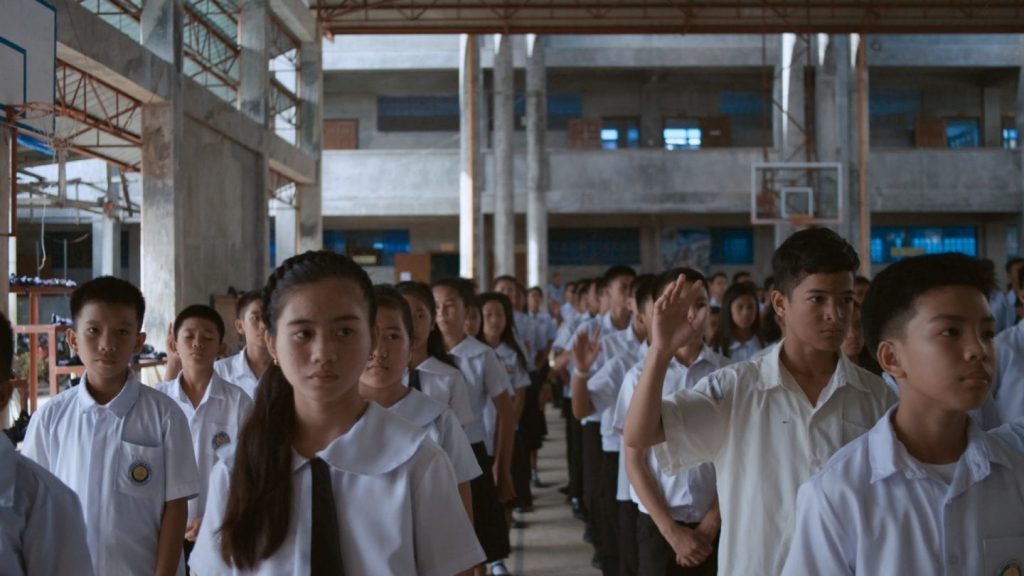
1. John Denver Trending
Director: Arden Rod Condez
In around 16th century AD, the world has fallen prey to the trend of the witch hunt, burning at the stake those who were accused of playing with black magic. Jeanne d’Arc (known popularly as Joan of Arc), despite her heroism and bravery during the Hundred Years’ War, a relatively known war involving the English and the French, Jeanne was put into trial for accusations of exhibiting witchcraft after saying that she had multiple visions of god, as represented by the angel Michael and St. Catherine. Time and again, innocent lives fall in bottomless trap holes, with justice never by their side. The same can be said in the modern era, where our lines of communication can reach even those who are miles apart from us. Social media is now the way to go when it comes to news, information access, and trend setting. What we see on our social networking sites are loads of superficiality, a haunting fabrication that turns everyone’s versions of reality as some sort of a commodity. That is why when something goes viral, everyone who’s everyone reaches it. Regardless if people have seen all the sides of the coin or not, judgment will be passed down. John Denver Trending tackles the familiar premise of bullying and public trial but masterfully creates an atmosphere of tension through its depiction of the toxic call-out culture, playing out like a witch hunt in the 21st century, where pitch forks come in the form of screenshots and videos and angry mobs reside in different parts of the world.
John Denver Cabungcal (a prodigious Jansen Magpusao) was caught on camera hurting his classmate for getting his bag after he was accused of stealing his classmate’s iPad. The video was posted publicly on Facebook and had resulted to John Denver being the talk of the town, or of the nation rather. John Denver was put on the spotlight as a suspect to a crime he never committed. And it did not stop from the video. His past actions were brought up and had been glamorized to make him look more antagonistic than he truly is. John Denver did not say much nor did he try do anything, not because he can’t, but because he’s powerless. He doesn’t have the social status nor the influence to raise his voice in the crowd of noise. That is why even though he is hurting because of how the society made him out to be, because of how he was ostracized by every single person in the world, almost including his mother (Meryll Soriano) who had almost doubted his words at one point, he remained silent behind all the accusations.
The horror lies in its timeliness as the country drowns in the fiery lake of fake news and mass manipulation. John Denver is the perfect representative of our Motherland: quiet, defenseless, repressed. As our society continues to support the maligned truths and well-packaged lies brought about by fake news, our nation’s foundations deteriorate, matter of factly to a point of dilapidation. With manipulated character interviews, fabricated stories, meme creations, flooded bashing etc., social media becomes a hell of its own. But more than social media being portrayed as a coliseum of truth and lies, the oppressed’s supposed first line of defense, policemen and journalists are put into question. The police wants to believe whatever is on their mind and shoves them on victims’ faces, never for one second acknowledging these victims and hearing out what they have to say. On another hand, pseudo-journalists exist and they are there to merely add fuel to fire by spreading the story and acknowledging an incorrect point as right and true. To them, it’s drama done right and they get to earn from it. Sometimes, they resort to adding or removing details in the so-called news that they disseminate. It’s scary, how hell has turned out to be other people. Sartre has never been more correct than ever.
Towards the end of the film, we see ourselves sobbing for the fate of John Denver Cabungcal. We see ourselves sobbing for the thought of Denver’s mother’s possible reaction after the scene. We see ourselves sobbing for the unruly children laughing behind a tired mother seeking for justice in a rotten system. And rightfully so. We should sob because the film is our country at the exact moment. We should sob because the film mirrors the status of our criminal justice system. We should sob because the film exhibits the precise state of our social media. We should sob because we refuse to look above and beyond, because we refuse to understand and care, because we refuse to open our eyes and lend our ears. John Denver Trending is a testament to how powerful film-making is and how it can reflect our society in the blink of an eye.
How about you? What are some of your most favorite Filipino films of 2019? Leave a comment below and tell us what they are.



